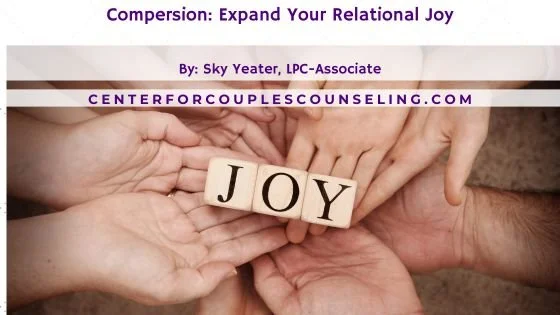Compersion: Expand Your Relational Joy
You know that feeling when you ‘heart react’ a friend’s wedding announcement or promotion, or watch your child or nibling (niece or nephew) open a gift from someone else and their face lights up? That’s compersion. In simple terms, it is joy at someone else’s joy. And, it’s a lot more.
The word compersion was coined in the 1990’s by the Kerista community, a Polyamory group in San Francisco. The concept of compersion has even deeper roots in Buddhism known in Sanskrit as Mudita.
Much like gratitude, compersion is an emotion that can be practiced, expanded, and help cultivate a sense of abundance. It is unique from gratitude in that it is relational. It is an emotion to be felt in the presence of and inspired by others to create more togetherness paradoxically because it celebrates the autonomy of those we love pursuing their dreams or pleasure regardless of, and often without, our own involvement while honoring our fundamental human connection to others’ joy. It is an emotion that celebrates the joys of a love on their unique journey. This is why it’s an important concept. It permeates far beyond the scope of multiple romantic engagements into any romantic relationships, parenting, friendship, co-working… every social aspect of our lives.
Compersion is often described as the opposite of jealousy. This applies if we think of jealousy as a lack of differentiation, co-dependence, or possessiveness. More accurately, it is the opposite of schadenfreude, a German word meaning “pleasure derived from another’s misfortune.”
There is much discussion on nonmonogamy forums about compersion. Many who think it cannot coexist with jealousy struggle. Emotions do not happen in a vacuum or a sliding scale. If we feel a lack of connection with our partner while they happily connect with others, we can struggle with feelings of jealousy while being happy for our person. These mixed feelings are a messenger to have a conversation and make some requests for our own needs. We can celebrate our friend’s engagement or promotion while feeling envy because our partner hasn’t proposed yet or we’re feeling held back at work.
Compersion is often easily accessible for parents, yet turns toward pride when the focus becomes the others’ actions and accomplishments we might feel are an extension of ourselves. It is exceptionally hard to access if our attention is on our own shortcomings. This is where a skilled therapist can help you think more relationally and build your self-worth.
The practice and function of compersion is about differentiating someone else’s actions toward joy from our own as best we can while knowing we can share in the joy itself. Expecting to feel pure compersion in nonmonogamy can put undue pressure on ourselves. In this context, neutrality is a perfectly valid feeling. Like any emotion, compersion is not a goal, it is a practice.
Outside of this context, let’s see if we can move beyond neutrality. Can we celebrate our partner’s joy of achieving despite not having played a role in their process? Can we cheer for our kid as they make a new friend and share a joke they learned? Can we hype a friend who got a tattoo they love, even if we never would? Why? Because it is a generous act that encourages our loved ones to share with us. Their feelings, their ideas, their own agendas, with less fear of judgment or negatively impacting others.
My favorite lines in my favorite song about nonmonogamy, Can’t Help But Fly are: “I love to hear you sing, even if I didn’t write the note… I love to hear you laugh, even if I didn’t tell the joke.”
Tips for practicing compersion:
1. Elevate your person/partner’s feeling over the cause. Think of a time someone else told a funny story and your partner laughed. While it’s easy to think “I wish I was that funny. Or “I wish I could make them laugh like that,” those are your own self-worth slashing brain gremlins that aren’t about their joy. Focus on the laugh.
2. Make a list of ways you can tell your person/partner is happy. What does their joy look and feel like? Then, make a list of things that make them happy that are on some level separate from yourself or your actions. Then, think of how they share those things with you or how you would like them to share with you. Express to your loved one “I can tell you’re excited about your new friend because you can’t stop smiling. Your smile lights up the whole world.”
3. Practice curiosity. When someone tells you of a dream or achievement, rather than immediately sharing your own dream or offering advice, ask them “What’s that like? What next steps are you excited about?”
4. Give characterological affirmations. Praise their inherent traits and abilities, and more importantly, specific examples of their impact on others. “You are so kind. I remember how excited you were to give your friend their birthday gift.”
5. Affirm your roles. The more clear and solid you feel in your connection with someone, the easier it is to celebrate the joys and successes that occur beyond and beside your influence. Express gratitude and pride for how they’re showing up. If it’s an adult partner or friend, appreciate that they’re choosing you every day. If it’s your child, appreciate their opportunity to learn, grow, and love in ways you might never expect.
While reading, have you reflected on times you’ve felt compersion? Are you noticing experiences or feelings that block your access? Are you wanting to learn more ways to expand empathetic joy in your relationships? I’m here to help! I will be your compersion co-explorer and archivist!
My name is Sky Yeater and I am a Licensed Professional Counselor Associate at the Center for Couples Counseling. I am passionate about helping couples and individuals pause, evaluate, set goals, and heal. To set up your free phone consultation so we can determine fit, call (832) 827-3288. Our Center serves couples and individuals in League City and Houston, Texas and all residents of Texas online!
Interested in Meeting a Couples Therapist in League City, TX?
If you want to improve your relationship and reconnect with your partner, take action now and start being more curious about your relationship. At Center For Couples Counseling, one of our skilled couples therapists can help you and your partner navigate your challenges and rediscover the curiosity and passion that brought you together in the first place. Don't wait any longer to invest in the health and happiness of your relationship. To meet with a couples therapist follow these three simple steps:
Contact us to schedule an appointment
Meet with one of our skilled couples therapists
Begin to find the curiosity in your relationship and reconnect with your partner!
Other Services Offered at Center for Couples Counseling
At Center For Couples Counseling, our team of skilled therapists understands that your relationship may be facing different challenges. In addition to couples therapy, our Texas practice offers individual therapy, infertility counseling, postpartum anxiety and depression counseling, therapy for self-care and burnout, and therapy for perfectionism. For more about us check out our FAQs and blog!






